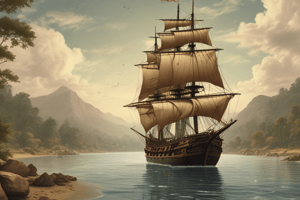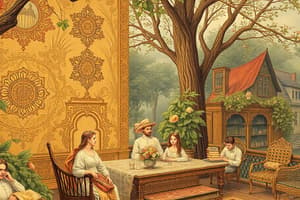Podcast
Questions and Answers
Who led the Massachusetts Bay Colony and was an influential English Puritan?
Who led the Massachusetts Bay Colony and was an influential English Puritan?
- John Winthrop (correct)
- Roger Williams
- John Smith
- William Penn
What was the primary cause of Bacon’s Rebellion in Virginia?
What was the primary cause of Bacon’s Rebellion in Virginia?
- Resistance against British taxation
- Land and trade competition (correct)
- Conflict with Native tribes
- Religious persecution
Which group of Native Americans formed the Iroquois Confederacy?
Which group of Native Americans formed the Iroquois Confederacy?
- Powhatan tribe
- Five (later six) Native nations (correct)
- Pequot tribe
- Algonquin tribes
What was the outcome of the Salem Witch Trials that took place in 1692?
What was the outcome of the Salem Witch Trials that took place in 1692?
Which of the following best defines the term 'indentured servants' as used in the context of early American colonies?
Which of the following best defines the term 'indentured servants' as used in the context of early American colonies?
Flashcards are hidden until you start studying
Study Notes
Key Figures in Early American History
- John Smith: English explorer and early leader at Jamestown, known for interactions with Native American woman Pocahontas.
- John Winthrop: Puritan leader who oversaw the founding of the Massachusetts Bay Colony, envisioned as a "City Upon a Hill."
- Anne Hutchinson: Puritan reformer who opposed male authority, leading to her trial and banishment from Massachusetts.
- Roger Williams: Puritan dissenter who founded Providence Colony, promoting religious freedom and separation of church and state.
- William Penn: Quaker leader and founder of Pennsylvania, established as a haven for minority religions.
- John Peter Zenger: Journalist who fought for freedom of the press in a landmark case against British authorities.
Native American Nations and Conflicts
- Iroquois Confederacy: Alliance of five (later six) Native American nations in the northeastern United States; known for political and military organization.
- Powhatan Indians: Native tribe involved in conflicts with Jamestown settlers, notably impacting early colonial relations.
Legislative and Labor Systems
- House of Burgesses: Established as the first elected legislative body in America, located in Virginia.
- Indentured Servants: Individuals who contracted to work for a certain number of years in exchange for passage to America and basic necessities.
Religious Groups and Settler Divisions
- Pilgrims vs. Puritans: Pilgrims were Separatists rejecting the Church of England, while Puritans sought reform within the church.
- Quakers: Known as the Religious Society of Friends, they emphasized direct communion with God, social equality, and nonviolence.
- Scots-Irish: Presbyterian group from Scotland and Northern England, faced persecution and migrated to America.
Significant Historical Events
- Columbian Exchange: 15th-century transfer of plants, animals, cultures, and diseases between the Americas, Europe, and Africa.
- The Starving Time: Severe winter (1609-1610) faced by Jamestown settlers, resulting in significant food shortages and deaths.
- Bacon’s Rebellion: Armed revolt in Virginia (1676-1677) led by Nathaniel Bacon against Governor Berkeley's administration.
- Pequot War: Conflict (1636-1638) between Pequot tribe and American settlers over land and trade competition.
- King Philip's War: Violent conflict (1675-1676) between Native Americans and colonists in New England, aimed at expelling settlers.
- Pueblo Revolt: 1680 uprising of Pueblo people against Spanish colonial rule in New Mexico.
Legal and Economic Frameworks
- Salem Witch Trials: Infamous 1692 trials in Massachusetts, leading to the execution of accused witches amid mass hysteria.
- St. Augustine: Established in 1565; first permanent European settlement in the Americas, founded by Spain.
- Massachusetts Bay Colony: Largest English settlement in New England, founded in 1628.
- Encomienda System: System of forced labor used by Spaniards during colonization, linked to exploitation of indigenous people.
- Headright System: Land grant system offering 50 acres to settlers for each immigrant planted to encourage settlement.
- Virginia Company: English trading company charted by King James I, instrumental in establishing Jamestown.
- Joint-stock Company: Business model allowing multiple investors to share in profits and risks of colonial ventures.
- Primogeniture: Inheritance system favoring firstborn children, influencing migration and land ownership.
- Mayflower Compact: Early governing document for Plymouth Colony, establishing a framework for self-governance.
- Fundamental Orders of CT: Framework of government for Connecticut, emphasizing popular sovereignty and civil government powers.
Studying That Suits You
Use AI to generate personalized quizzes and flashcards to suit your learning preferences.




